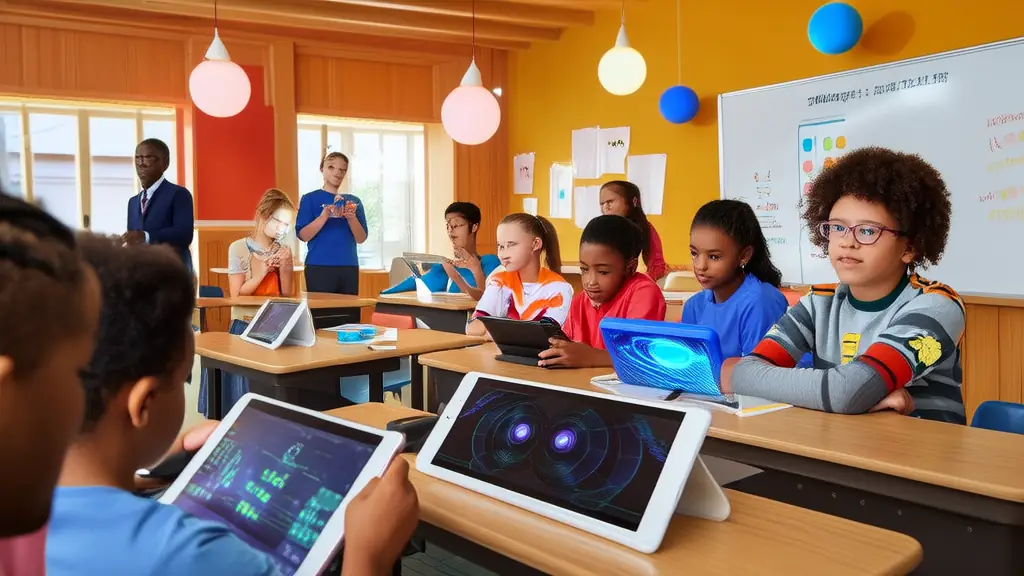
Empowering the Future: Navigating K12 Education in 2025
Welcome to our exploration of the evolving landscape of K12 education. As we stand at the cusp of a new era, it's crucial for both parents and educators to stay informed about the latest trends, methodologies, and technologies that are shaping the educational experiences of our children. This blog post aims to provide you with valuable insights, practical tips, and inspiring success stories that can help guide your efforts in nurturing the next generation of learners.
Latest Teaching Methodologies and Their Effectiveness
In recent years, there has been a significant shift towards more student-centered and interactive teaching methods. One such approach is Project-Based Learning (PBL), which encourages students to engage in real-world projects that require critical thinking, problem-solving, and collaboration. Research indicates that PBL not only enhances academic performance but also boosts students' confidence and engagement. For instance, a study conducted by the Buck Institute for Education found that students who participated in PBL showed a 23% increase in their overall content knowledge compared to those in traditional classrooms.
Another effective methodology is Flipped Learning, where students review lecture materials at home and use class time for hands-on activities, discussions, and problem-solving. This approach has been shown to improve comprehension and retention, as it allows students to apply what they've learned in a supportive environment. A case study from Clintondale High School in Michigan demonstrated a 33% reduction in course failure rates after implementing flipped learning.
Child Development Insights and Research
Understanding child development is key to creating effective educational strategies. Recent research highlights the importance of social-emotional learning (SEL) in fostering well-rounded individuals. SEL programs focus on developing skills like self-awareness, self-management, social awareness, relationship skills, and responsible decision-making. According to a meta-analysis by the Collaborative for Academic, Social, and Emotional Learning (CASEL), students who participated in SEL programs showed an 11% gain in academic achievement and improved behavior and attitudes.
Additionally, the concept of growth mindset—the belief that abilities and intelligence can be developed through dedication and hard work—has gained traction. Studies by Dr. Carol Dweck at Stanford University show that students with a growth mindset are more likely to embrace challenges, persist in the face of setbacks, and achieve higher levels of academic success. Teachers can foster a growth mindset by providing constructive feedback, encouraging effort over innate ability, and celebrating progress and improvement.
Educational Technology Trends
The integration of technology in K12 education continues to evolve, offering new opportunities for personalized and engaging learning experiences. Adaptive Learning Technologies use algorithms to tailor content and pace to each student's needs, ensuring that they receive the right level of challenge and support. Platforms like DreamBox and Khan Academy have been successful in improving math and reading skills, with some schools reporting up to a 20% increase in standardized test scores.
Another trend is the use of Virtual and Augmented Reality (VR/AR) in the classroom. These technologies provide immersive, interactive experiences that can enhance understanding and retention. For example, Google Expeditions allows students to take virtual field trips to historical sites, museums, and even outer space, making learning more engaging and memorable. Educators can also use AR apps to bring textbooks to life, allowing students to interact with 3D models and animations.
Practical Tips for Parents and Teachers
For Parents:
- Stay Informed and Involved: Attend parent-teacher conferences, join school committees, and stay updated on your child's curriculum and progress. Your involvement can make a significant difference in their educational journey.
- Support SEL at Home: Encourage empathy, resilience, and positive relationships. Practice active listening, model healthy coping strategies, and provide opportunities for your child to develop social skills.
- Embrace Technology: Familiarize yourself with the digital tools and platforms your child uses. Set guidelines for screen time, and ensure that technology is used in a balanced and productive way.
For Teachers:
- Implement Student-Centered Approaches: Incorporate PBL, flipped learning, and other interactive methods to engage students and promote deeper learning. Provide opportunities for students to take ownership of their education.
- Foster a Growth Mindset Culture: Encourage a classroom environment where mistakes are seen as learning opportunities. Use language that emphasizes effort and progress, and celebrate small victories along the way.
- Leverage Educational Technology: Integrate adaptive learning tools, VR/AR, and other digital resources to enhance instruction and create engaging, personalized learning experiences. Stay current with the latest edtech trends and best practices.
Conclusion and Call to Action
As we navigate the ever-evolving world of K12 education, it's essential to stay informed, adaptable, and committed to the success of our children. By embracing the latest teaching methodologies, understanding child development, leveraging educational technology, and following practical tips, we can create a robust and supportive learning environment that prepares students for the future.
Join us in this mission to empower the next generation. Share your own success stories, ask questions, and connect with other parents and educators in our community. Together, we can make a lasting impact on the lives of our children and the future of education.